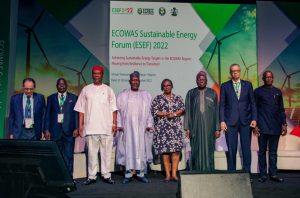ECOWAS agency moves to develop Nigeria’s power grid
December 21, 2022319 views0 comments
By Innocent Obasi
The West African Power Pool (WAPP), a special agency of ECOWAS, has said it will enhance the reliability of the Nigerian power grid with a 330KV transmission line from Nigeria to Benin to promote economic development.
The project primarily consists in the construction and operation of about 130 kilometres of 330 kV DC interconnection line between Nigeria and Benin with a right-of-way of 50 metres.
This disclosure was made by the agency during a stakeholders’ forum held in Abeokuta aimed to sensitise the public on the project by ensuring that the relevant key players such as the stakeholders and the local populace especially are abreast of the information.
Read Also:
- Nigeria: Time for backward integration, import substitution (2)
- Africa’s first now fourth: Running down Nigeria’s economy in 10 years
- Moving insurance from good to great in Nigeria and Africa
- Wale Owoeye shines among Nigeria’s top 50 digital economy leaders
- Moniepoint MFB wins best Fintech for supporting Nigeria's hospitality industry
Mamoud Abubakar, the coordinator of WAPP activities in Nigeria, said it was important to inform the populace of the status of the project to enable acceptance and support while discussing the mitigations and compensation measures for the affected communities during the course of the project.
Abubakar disclosed that WAPP is made up of public and private generation, transmission, and distribution companies involved in the operation of electricity in West Africa.
He said the 330 kV DC Nigeria-Benin Interconnection Reinforcement Project is part of this large regional network integration process.
He disclosed that the project is under the auspices of the WAPP in collaboration with the Transmission Company of Nigeria (TCN), and the Communauté Electrique du Bénin. He also added that the new line comprises two sections: Ajegunle in Ado-Odo/Ota LGA- Onigbolo in Benin which is 78.7kilometres; and Onigbolo – Sakété (Benin) which is 51.4 kilometres.
”It is anticipated that the project will supply electricity to communities between 500 to 2,500 inhabitants) within a 5-km radius from the proposed line,” the coordinator said.
He noted that the project would be beneficial to the country and the local populace in terms of generating training opportunities for the local labour during construction, increasing tax revenue collection by the government to the stimulation of the local economy, creating temporary jobs during construction, increasing the capacity, efficiency and reliability of the electric grid, and curbing power failures.
Furthermore, the coordinator said that the ECOWAS-sponsored programme which would be counter-funded by the Federal Ministry of Power has put in place compensation measures for individuals that would be affected by the project.
He said that the African Development Bank (AfDB) would be rendering assets as compensation for individuals who are economically or physically affected by the project.
“The Resettlement Action Plan presents the stakeholders’ eligibility to the compensation aspect and resettlement program details for the local community and PAP.
The compensation costs are calculated on the basis of the area involved, the use and the main building material; Crop lands, crops cultivated and economic trees,” he confirmed.

